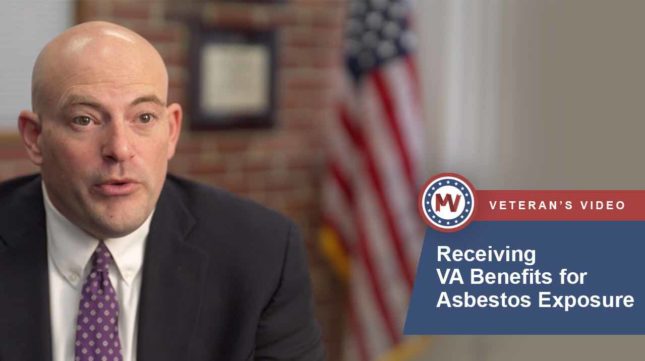U.S. military veterans with mesothelioma often qualify for many helpful VA benefits.These include monthly financial payouts of $3,946.25 or more to help with living expenses, and free or low-cost treatments from mesothelioma specialists. Get help filing for mesothelioma VA benefits right now for free.
Veterans Benefits for Military Asbestos Exposure
Mesothelioma develops decades after asbestos exposure, and asbestos was used by all branches of the U.S. armed forces: the Air Force, Army, Coast Guard, Marine Corps, and Navy. As a result, 1 in 3 mesothelioma patients is a veteran.
Thankfully, the U.S. Department of Veterans Affairs (VA) offers benefits to help veterans with mesothelioma and other asbestos-related diseases.
You may be eligible for mesothelioma VA benefits that include:- Aid and Attendance (A&A)
- Disability compensation
- Health care for veterans
- Housebound benefits
- Pensions
Your family members may also qualify for mesothelioma VA benefits like financial compensation and health care.
VA mesothelioma benefits for family members include:
- Dependency and Indemnity Compensation (DIC)
- Funeral benefits
- Health care for dependents
- Survivor pension (also called death pension)
The Mesothelioma Veterans Center has helped thousands of veterans get VA benefits and other helpful resources for nearly 10 years. File mesothelioma VA claims for free by working with our team.
How to File a Claim For Mesothelioma VA Benefits
Most veterans must file post-service claims to get veterans benefits for mesothelioma. This cancer typically develops decades after exposure, and almost all military members have retired by the time they’re diagnosed.
Video Summary: VA-accredited attorney Eric Hall notes the different VA benefits available to veterans and families affected by mesothelioma. View Transcript
Veterans diagnosed with asbestos-related diseases are entitled to several different types of benefits from the VA to include disability benefits, [and] health care benefits. There are even survivor benefits for those with asbestos-related diseases.
Veterans who have been diagnosed with mesothelioma as a result of their service in the military are likely to receive a benefit of $3,500 of monthly income tax-free to the veteran.
Veterans with mesothelioma who are exposed while they were in the service are also entitled to private benefits as well, and we encourage veterans to call and find out how we can help them.
Learn about the steps to file a mesothelioma VA claim below.
1. Determine Eligibility for Mesothelioma VA Claims
You can pursue VA benefits for mesothelioma if you:
- Developed mesothelioma due to your military service
- Served on active duty or had active duty/inactive duty training
- Were honorably discharged
Contact our team now to find out if you can access mesothelioma VA benefits.
2. Gather Evidence
You’ll need evidence to support your VA mesothelioma claim, such as documents showing when and where you were exposed to asbestos fibers while you served, medical records related to your diagnosis, and a doctor’s written statement linking exposure to your illness.
The Mesothelioma Veterans Center team, including VA-accredited Eric Hall, can assist in this process, making it easier and less stressful.
“When I help a veteran apply for mesothelioma VA benefits, I do that at no cost to them.”
— Eric Hall, Major USAFR and VA-accredited attorney
3. Get a Medical Exam
Generally, the VA requires veterans to get a medical exam to see if their illness is service-related before awarding benefits.
Since asbestos is a known toxin, the VA classifies mesothelioma as a presumed disability. This means that you may be able to bypass this exam if you have enough evidence to support your claim.
4. File the Mesothelioma VA Benefits Claim
Once you have the needed evidence, you can file for mesothelioma VA benefits. The VA recommends working with a VA-accredited agent to make the claims process less stressful. We have VA claims agents on staff who can help you file for mesothelioma benefits with ease.
You also can file by mail, in person, online at va.gov, or with the help of a lawyer or claims agent.
There are no time limits to file for mesothelioma VA benefits. But, it’s in your best interest to file as soon as possible as mesothelioma is very aggressive and VA benefits allow veterans to afford life-extending treatments.
5. Await a Decision and Receive Benefits
Once the claim has been submitted, the VA will review it and award benefits. It normally takes a few months for the VA to review a claim. However, the Mesothelioma Veterans Center can often speed up the process.
Our VA-accredited agents can get key information ahead of time when building your claim and contact your local congressperson to help process it faster. Some claims have been reviewed in one month or less with our assistance.
Types of Mesothelioma VA Benefits
VA Disability Compensation
Those suffering from a disability related to their service may qualify for tax-free VA disability compensation.
More money may be available if the veteran has dependent children or if they need the help of a caregiver.
VA Pension
Pensions are provided to disabled veterans whose net worth is under $155,356 for 2024. VA pensions are paid out in monthly installments.
A veteran must have served on active duty for 90 days or more to file a mesothelioma VA pension claim. A veteran’s income, number of dependents, and disability rating all affect how much they’ll receive through a pension.
File a mesothelioma VA claim right now to pursue pensions and other benefits that you qualify for as a former service member.
- VA Disability Claims
- Survivor Benefits
- Finding Veteran Doctors
Aid and Attendance (A&A)


Veterans can receive A&A if they are bedridden, live in a nursing home, or need a caregiver to help with dressing, bathing, or other daily activities.
“Aid and Attendance is worth a few hundred dollars, but an additional few hundred dollars can go a long way.”
— Eric Hall, Major USAFR and VA-accredited attorney
Housebound Benefits
Housebound benefits are a form of extra VA compensation for asbestos exposure awarded on top of a pension. It’s available to veterans who can’t leave home due to a disability. Veterans can’t receive housebound benefits and Aid and Attendance simultaneously.
VA Health Care for Veterans
Veterans can use the VA health care system to access free or low-cost mesothelioma treatments from doctors at select VA hospitals.
The VA has many top mesothelioma doctors on staff, including Dr. Daniel Wiener in Boston and Dr. Robert Cameron in Los Angeles. If the veteran gets a referral to one of these specialists from their local doctor, the VA may pay for travel expenses.
See how VA health care benefits can help you access mesothelioma treatments with our Free Veterans Packet.
Mesothelioma VA Benefits for Spouses and Dependent Children
The surviving spouse and children of a veteran who passed away from mesothelioma can also pursue VA benefits. Learn about available benefits below.
VA Dependency and Indemnity Compensation (VA DIC)
VA Dependency and Indemnity Compensation (VA DIC) is tax-free compensation paid to a veteran’s survivors. Families can apply for VA DIC if their loved one died in the line of duty or from a service-connected disability like mesothelioma.
Survivors Pension
A spouse and other dependents of a veteran may be eligible for a survivors pension. To qualify, the family’s net worth must be under $155,356 as of 2024. The veteran’s service record (when they served and for how long) also affects their eligibility.
VA Health Care Through CHAMPVA

The Civilian Health and Medical Program of the Department of Veterans Affairs (CHAMPVA) is health care for families of disabled or deceased veterans. CHAMPVA allows qualifying family members to access health care at a lower cost.
A spouse or child of a veteran who is 100% disabled or died from a service-related condition like mesothelioma may qualify for CHAMPVA coverage. These family members must not be eligible for another VA health care service known as TRICARE.
Funeral and Burial Reimbursement
The VA pays burial expenses in many cases. The VA will pay up to $2,000 if the veteran passed away due to a service-related condition on or after September 11, 2001. If the veteran died before that date, VA burial benefits pay out up to $1,500.
The VA also provides military funeral honors, which can be performed at both national and private cemeteries. Most funeral directors can help families access funeral honors.
Finally, family members can receive military headstones for the veteran’s grave through the VA.
File for Mesothelioma VA Benefits Now
Work with the Mesothelioma Veterans Center to pursue your VA benefits right now. Since our founding in 2015, we’ve helped thousands of veterans access VA benefits and other resources.
Our skilled team, including VA-accredited lawyer Eric Hall, can help you get the benefits you’re entitled to for free and with less stress.
The Mesothelioma Veterans Center can help you:
- File for mesothelioma VA benefits
- Get a 100% VA disability rating faster
- Increase your VA disability rating if needed
- Pursue private claims without impacting your VA benefits
Call (877) 450-8973 now to file for mesothelioma VA benefits. Our team is available 24/7 to help you.
Disclaimer
The Mesothelioma Veterans Center has no affiliation with and is not endorsed or sponsored by Dr. Robert B. Cameron. The contact information above is listed for informational purposes only. You have the right to contact Dr. Cameron directly.
Mesothelioma VA Benefits FAQs
Is mesothelioma a VA disability?
Yes, mesothelioma is considered a VA disability if it was caused by military asbestos exposure.
The VA almost always assigns a 100% disability rating to veterans with mesothelioma that stems from military asbestos exposure. This means that eligible veterans can get the highest payouts from VA disability claims.
Veterans who have other asbestos-related illnesses like lung cancer and asbestosis may also receive high disability ratings.
How much is the VA compensation for asbestos patients?
Married veterans with mesothelioma typically receive $3,946.25 each month if they’re married through VA disability compensation alone.
Veterans can also file private asbestos claims to pursue additional compensation from the makers of asbestos-containing products.
Mesothelioma lawsuits pay out $1 million or more on average, and asbestos trust funds contain more than $30 billion.
Private claims are not filed against the U.S. military or government and won’t impact your ability to file for mesothelioma veterans benefits.
Can I claim for mesothelioma?
Possibly, yes. Veterans with mesothelioma, asbestos lung cancer, and other types of cancer linked to military service are entitled to claim VA benefits.
To qualify for mesothelioma veterans benefits, you must show that you were exposed to a cancer-causing substance like asbestos while serving.
The VA recognizes that mesothelioma and lung cancer do not usually appear until 10-50 years after asbestos exposure.
As a result, you might qualify for benefits even if you were exposed decades ago.
Is my income too high to get mesothelioma veterans benefits?
No. There are benefits for all veteran mesothelioma patients regardless of income. Monthly financial benefits and VA health care can provide peace of mind and security for you and your family.
What costs can be covered with my mesothelioma VA benefits?
A wide range of costs can be covered by VA benefits. VA financial benefits can pay for basic living expenses, in-home care, and funeral costs. VA health care benefits can cover mesothelioma treatment bills.
Your spouse may also qualify for monthly payments from the VA if you pass away from mesothelioma. File for mesothelioma VA benefits right now.
Can veterans from any military branch pursue mesothelioma benefits?
Yes. U.S. veterans from any branch of the military could have been exposed to asbestos if they served between the 1930s and early 1980s. If this exposure led to mesothelioma, the veteran may qualify for VA benefits.
U.S. Navy veterans were at the highest risk of exposure as Navy ships and shipyards used tons of asbestos-containing products.
Our team can determine how you were exposed and help you file for mesothelioma VA benefits. Get started now.




